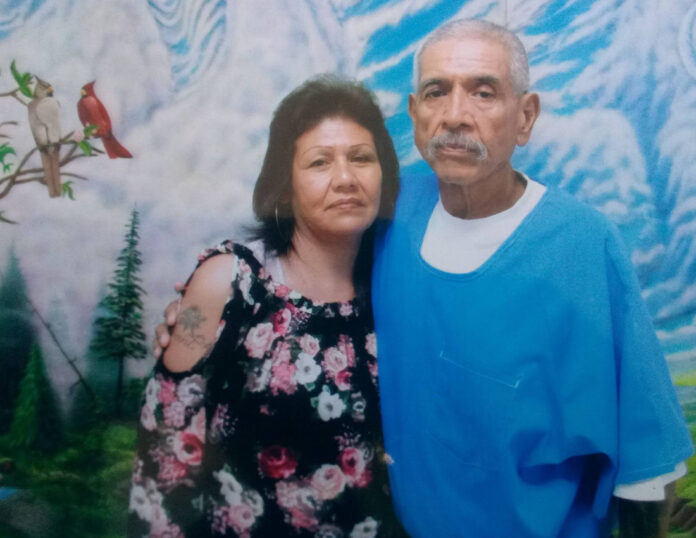
CALIFORNIA—Vincent Marquez will be the first to say he has not led a perfect life.
He is in Soledad State Prison for a 2008 burglary conviction, serving sentences totaling more than four decades that could keep the 65-year-old incarcerated until 2041.
But he hopes to change that soon. He is among thousands of incarcerated people statewide that could be eligible for sentence reductions thanks to a spate of new laws that took effect Jan. 1, some of which take aim at sentence enhancements.
Marquez says the crime that landed him in prison was part of a string of convictions he says stemmed from a lifelong heroin addiction he has since beaten. He dropped out of a gang in 1999, and says he has stayed out of trouble in prison except for a marijuana possession charge three years ago.
That tacked an additional 300 days onto his sentence, despite the fact pot has been legal since 2016. Still, the infraction lost him his visits for three years, and he was placed in administrative segregation, commonly called “the hole” in prison lingo.
Not one to downplay his crimes, he points out that he never physically hurt anyone. He says he is now a changed man.
“I was a criminal, I was a thief, I did not have any regard for the property of others,” he wrote in a letter to this publication. “That was me 14 years ago, it is not me anymore.”
Marquez’s minimum parole date is in 2041, but he will be eligible for early “elderly parole” in 2028, according to the CDCR. That agency says Marquez’s case is not considered one of public interest.
If released, Marquez says he has dozens of supporters waiting for him on the outside to aid his return, including his wife of 30 years.
Among these is Pajaro Valley Ohlone Indian Council Chair Patrick Orozco, who in a letter to the California Department of Corrections and Rehabilitation (CDCR) signed by 17 people says that Marquez has a community of more than 200.
But convincing a court to resentence him could be a tall order for Marquez. The CDCR declined to refer him for resentencing based largely on the marijuana convictions, telling him in a March 15 letter to “remain disciplinary free.” The letter also cited his criminal record and says that he has not participated in any self-help programming.
Still, Marquez says he is now serving only the time for his enhancements, making him eligible to benefit from the new laws. He says he is considered a high-risk medical prisoner, thanks to asthma, hip replacement surgery and his age.
“I no longer present a threat to the community, no one was hurt or even contacted during the commission of the burglary,” he wrote.
The New Laws
Senate Bill 483
Retroactively removes 1-year prison prior and 3-year drug prior enhancements, unless the conviction was for a sexually violent offense.
Under this law, the CDCR is required to identify eligible incarcerated persons for these enhancements and provide this list to the court that sentenced them.
Resentencing hearings include consideration of how well the incarcerated person is doing in prison.
Incarcerated persons who are only serving time for enhancements were required to be identified by March 1. The courts must recall and resentence each of these by Oct. 1.
Everyone else with enhancements must be identified by July 1 and resentenced if eligible by the end of 2023.
Assembly Bill 1540
Clarifies procedures and incarcerated person’s rights regarding resentencing.
Requires that a judge hold a status conference within 30 days of receiving a referral, and states that incarcerated persons be notified of their referrals.
The law also states that judges can resentence incarcerated persons to lesser offenses.
Referrals can be denied only if the court determines that the incarcerated person poses an “unreasonable risk of danger to public safety.”
Referrals must come by referral of DA or CDCR and everyone eligible for resentencing has the right to an attorney.
Assembly Bill 124
Requires the court to consider circumstances such as age, disciplinary record, record of rehabilitation and diminished physical condition of the incarcerated person.
Also states the court should consider if the person has experienced psychological, physical or childhood trauma, such as abuse, neglect, exploitation, sexual violence or domestic violence.
Senate Bill 775
Allows people convicted of attempted murder or manslaughter—or who committed a felony that unintentionally resulted in a killing—to have their sentences vacated and be resentenced.
A DA’s Take
Marquez submitted a resentencing request to the Santa Cruz County District Attorney’s Office on Feb. 14 but has not yet received a response. This, he reckons, is the same as a denial.
Santa Cruz County District Attorney Jeff Rosell said he was unfamiliar with Marquez’s case, but says the laws allow DAs to weigh in when the courts make their decisions.
Rosell added that CDCR’s decision not to recommend him for resentencing would likely factor into the case locally.
Rosell says that his office is willing to consider resentencing requests under SB 493. So far, he has seen roughly a dozen, and has approved the majority.
“We at the Santa Cruz County’s District Attorney’s Office are willing to work with the courts, and the public defenders on implementing these laws, and review all of these on a case-by-case basis,” he said.
Monterey County Chief Assistant District Attorney Berkley Brannon says that a resentencing petition depends on the facts of the case, the defendant’s record and whether the DA believes the sentence was unjust.
Brannon points out that in more than 95% of cases, the defendant agrees to the sentence when they make their plea.
Out of the new laws, Brannon says his office only opposes SB 483.
“It rewards recidivism because it seeks to treat inmates who have been to prison one or more times the same as inmates who have not,” he stated in an email. “It seeks to treat drug dealers who have been convicted of drug dealing one or more times the same as defendants who have not.”
The law also creates a “windfall” for defendants who have already agreed to a sentence, Brannon says, and often have received benefits from those agreements such as reduced or dismissed charges.
“Now the state is invalidating part of the contract, but only in a way which unilaterally benefits the defendant,” he stated. “Those who reached a deal without agreeing to plead to one- or three-year priors get no benefit.”
Brannon also points out that the law will add costs to district attorneys’ offices, since it is retroactive and creates an additional workload.
The California County Resentencing Pilot Program, launched last year by Gov. Gavin Newsom, provides just $18 million for the nine counties that have implemented Prosecutor-Initiated Resentencing programs.
Public Defender’s View
While the new legislation could be beneficial to incarcerated persons like him, Marquez says that leaving the referrals up to district attorneys and CDCR could be problematic.
“The fox is in charge of guarding the henhouse,” he said.
“Even though the DA’s that are presently in compliance with these new guidelines and have started pilot programs to implement the new procedures, I can count the people that have benefitted on one hand,” he added.
That assessment seems to be a pattern.
According to attorney Michelle Lipperd, who runs the Clean Slate Program for the law firm Biggam Christensen and Minsloff—which provides Santa Cruz County’s public defender services—CDCR has 96,000 incarcerated people that could benefit from the new laws but has referred just 2,000.
“(Referrals by DAs and the CDCR) are the only mechanism to get them there, and so far I haven’t had any from CDCR with their recommendations,” Lipperd said. “And our current DA’s office really does not have any mechanism in place to do their own reviews. They are relying on us to find the cases and bring them to their attention.”
That can be a problem with just one attorney currently working on the issue in the county’s public defender office, Lipperd said. But that task could get easier with the new Santa Cruz County Public Defender office set to take over on July 1, she says.
“I’m hoping when we get into the new office we’re going to have three attorneys, three paralegals, six interns helping me with this,” she said. “So we will have a lot more resources, but right now I’m getting calls from people in prison, I’m getting petitions sent to me, and I am working each of these cases as they come across my desk.”
Lipperd says that the CDCR has sent a list of 10 people currently serving time only for their enhancements, and who qualify for a resentencing.
One was a convicted murderer who did not qualify, she says.
An additional list of people is who haven’t yet served their base sentence and also have enhancements is expected in July.
“Hopefully by then, we’ll be able to streamline the process on how easily we’re going to be able to get their resentencings heard,” Lipperd said. “We’re just really trying to work our way through this process, and it is a bit intimidating, but I want to get as many clients back in front of the court to give them the discretion to make these changes.”
Heather Rogers, who on July 1 will take the helm of the new Public Defender office, says that the new laws could reshape the penal system for people who have historically seen its harsher side.
“We know that for the most part our carceral system has an adverse impact on people of color and on traditionally marginalized communities,” she said. “And so in a state that’s focused on equity, we have to think about how sentencing reform can right some historic wrongs.”
They are also a testament to growing beliefs that prison time frequently has unintended negative consequences, she says.
“It’s really been pretty well established now that incarcerating people for longer doesn’t lead to better results,” she said. “In fact it leads to worse results, and that a shorter sentence can have the same deterrent effect.”
For information, visit bit.ly/38IfiGN.











